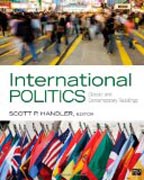
This comprehensive and smartly organized Reader showcases the very best, most engaging international relations scholarship and political debate: over 90 carefully edited readings representing the field's central traditions as well as important contemporary debates that capture new challenges and trace the development of the scholarship. But this is more than just a mere collection of readings: International Politics is purpose-bulit to help instructors and students engage critically, and in the spirit of intellectual pluralism, with some of the world's most challenging and provocative questions. The readerÆs substantial part headnotes put each of the selections into context and also into conversation with one another, and Handler consciously models good critical analytic questions throughout. At the end of each part header, there is a set of robust discussion questions that serve to guide discussion of the readings or provide the basis for essay questions. Throughout, International Politics emphasizes the importance of intellectual pluralism in reaching conclusions about the worldÆs most pressing problems, and the selections have been chosen in order to best represent the full scope of topics and approaches. Unique to this reader are selections in each part focused specifically on ethical issues, which invite readers to engage in and make complex decisions about world dilemmas. The bookÆs four main partsùtheoretical traditions, war and peace, international political economy, and emerging issuesùdovetail with how most IR courses are taught. In Part I, the major traditions covered include introductions to realism, liberalism, constructivism, their major variants, social scientific and theoretical analysis, and decision-making models. In Part II, topical coverage includes the security dilemma, balance of power, deterrence, bargaining models, theories of democracy and war, civil conflict, terrorism, and the ethics of war. Part II features selections on international political economy, with readings on international trade, hegemony and trade, domestic politics and trade, international monetary affairs, and ethics and IPE. The fourth part of the book looks at emerging issues, including power and inequality, state-building, failed states, foreign aid, international law, the environment, international order, and ethics and development assistance. Class-tested over several years at the United States Military Academy and elsewhere, International Politics was built from the ground up to introduce students to the traditions and new foundations of international relations as well to the principles of intellectually rigorous thought. Priced for value, the reader offers nearly twice the number of readings as other leading IR readers and a much broader choice of topics, but at the same price. INDICE: ContentsI. THEORETICAL TRADITIONS IN INTERNATIONAL RELATIONS1. Introduction2. Social Scientific and Theoretical Analysis3. Realism I4. Realism II5. Liberalism I6. Liberalism II7. Constructivism I8. Constructivism II9. Decision-Making Models10. Ethical Traditions in International RelationsII. WAR AND PEACE11. The Security Dilemma12. Balance of Power13. Deterrence14. Bargaining and War15. Theories of Democracy and War16. Civil Conflict17. Terrorism18. The Ethics of WarIII. INTERNATIONAL POLITICAL ECONOMY19. Introduction to International Political Economy20. International Trade21. Hegemony and Trade22. Domestic Politics and Trade23. International Monetary Affairs24. Ethics and International Political EconomyIV. EMERGING ISSUES IN INTERNATIONAL RELATIONS25. Poverty and Inequality26. State-Building27. Failed States28. Foreign Aid29. International Law30. The Environment and Climate Change31. A New International Order?32. Ethics and Development Assistance
- ISBN: 978-1-4522-6799-9
- Editorial: CQ Press
- Encuadernacion: Rústica
- Páginas: 568
- Fecha Publicación: 16/01/2013
- Nº Volúmenes: 1
- Idioma:
